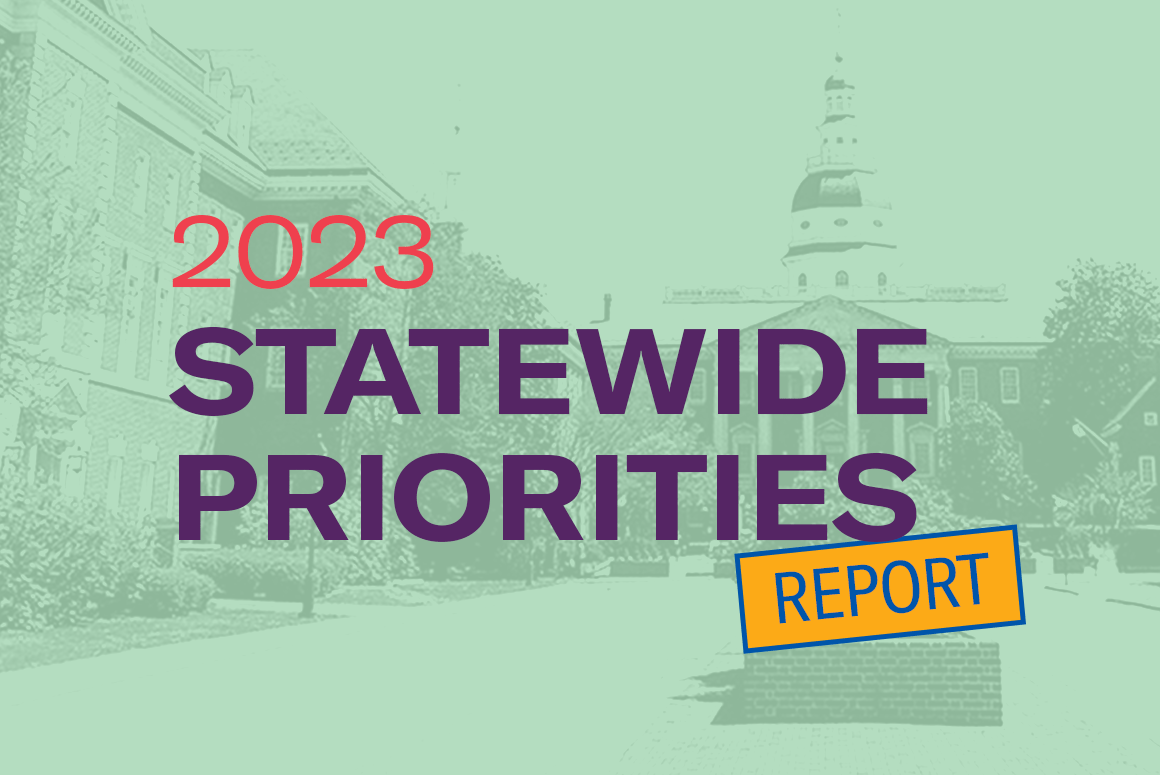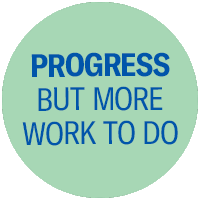

Get more information on ACLU of Maryland's priorities for the 2023 General Assembly, including videos and fact sheets.
PRIORITY LEGISLATION
 Ban Marijuana Odor Police Stops and Searches - Victory!
Ban Marijuana Odor Police Stops and Searches - Victory!
This session the ACLU of Maryland worked with the Maryland Coalition for Justice and Police Accountability, the Maryland Legislative Black Caucus, and other partners to support HB 1071 / SB 51, which seeks to prohibit police from using the alleged smell of marijuana to stop an individual or perform a warrantless search of a vehicle. For decades, police have been granted the authority to conduct searches based on something that cannot be categorically proven: a claim based solely on their sense of smell. These claims by police have been routinely used to infringe on individuals’ privacy rights and justify racial profiling.
More specifically, HB 1071 prohibits a law enforcement officer from initiating a stop or a search of a person or motor vehicle based solely on one or more of the following types of evidence:
- The odor of burnt or unburnt marijuana.
- Possession (or suspicion of possession) of cannabis that does not exceed the personal use amount.
- The presence of cash or currency in proximity to marijuana without other evidence of an intent to distribute.
The bill also explicitly includes the “exclusionary rule,” which bars any evidence obtained in violation of this statute from being admitted at trial. This rule will help deter law enforcement from conducting illegal stops and searches. Furthermore, HB 1071 reduces the first-offense penalty for smoking marijuana in a public place to a maximum fine of $50 (rather than $250 under current law) and for a second or subsequent offense, to a maximum fine of $150 (rather than $500 under current law).
HB 1071 passed both the House and Senate and will go into effect on July 1st, 2023.
 Eliminate Criminal Penalties for Marijuana - Disappointment
Eliminate Criminal Penalties for Marijuana - Disappointment
This session, the ACLU of Maryland worked with our partners to support HB 280 / SB 73, which would eliminate criminal penalties for certain marijuana-related offenses. Instead, the bill sought to designate possession of more than the personal-use amount and possession with intent to distribute as civil offenses, subject to citations and civil fines, rather than imprisonment.
Although Maryland voters overwhelmingly approved ending the criminalization of the recreational use of marijuana, under the new law, marijuana-related offenses, such as possession with intent to distribute and possession of more than the civil-use amount, can still result in a misdemeanor conviction. And without eliminating these penalties, Black people will be vulnerable to existing arrest patterns, which will result in Black people being saddled with criminal penalties despite legalization. Unfortunately, HB 280 / SB 73 were never brought for a vote in the House Judiciary Committee or Senate Judicial Proceedings Committee.
 Ensure Independent Investigatory Powers for Police Accountability Boards - Disappointment
Ensure Independent Investigatory Powers for Police Accountability Boards - Disappointment
This session the ACLU of Maryland worked with the Maryland Coalition for Justice and Police Accountability to support SB 285, which would explicitly allow local jurisdictions to grant their Police Accountability Board’s power to conduct independent investigations and issue subpoena-powers. The Maryland Police Accountability Act of 2021 directed all counties and Baltimore City to establish a Police Accountability Board (PAB) and Administrative Charging Committee (ACC). However, no PABs in Maryland currently have these critical oversight powers because the Fraternal Order of Police undermined local support by improper claims about local governing authority under the Maryland Police Accountability Act.
Unfortunately, despite its importance, strong community support, and research showing that independent investigatory and subpoena powers are critical functions of a community oversight board, SB 285 did not receive a vote or advance in the Senate. We are disappointed that a simple, clarifying bill such as SB 285 failed to move this session. But we will continue to work with the Maryland Coalition for Justice and Police Accountability to pass the bill next year.
 Remove the Governor from Medical Parole - Disappointment
Remove the Governor from Medical Parole - Disappointment
In 2021, the General Assembly at long last removed the governor from the parole process. Before the passage of SB 202, Maryland was one of only three states that allowed the governor to overturn parole decisions for people serving life sentences with the possibility of parole. However, due to a bill drafting error, the bill that passed and has since been enacted excludes medical parole, making medical parole the only type of parole that would require action by the governor. We worked to remedy this error for the second year by supporting a technical fix bill, HB 47 / SB 33. Unfortunately, even though the bill passed out of the Senate Judicial Proceedings Committee in good posture, the bill was not brought up for a vote in the House Judiciary Committee.
Next session, the ACLU of Maryland will resume work to ensure this technical fix bill is passed and parity is created across the parole process for Marylanders serving life sentences.
 Pass a Voting Rights Act in Maryland - Disappointment
Pass a Voting Rights Act in Maryland - Disappointment
This session, the Maryland Voting Rights Act (MDVRA) was introduced for the first time. Only one county in Maryland (Montgomery County) has ever fallen under the coverage of the federal Voting Rights Act of 1965.
SB 878 / HB 1104 sought to bring the full protections of the federal Voting Rights Act to the state of Maryland. The MDVRA would institute pre-clearance with the attorney general before changes to election administration can be made by a covered jurisdiction. It would provide a framework to fight vote dilution that is efficient and cost-effective. It would require local jurisdictions to provide adequate language access to voting materials for non-English speaking communities. It would also prohibit voter intimidation by providing Marylanders a civil cause of action to sue for voter intimidation, deception, or obstruction. Additionally, the bill would establish a statewide database for election and demographic data. The MDVRA would also make legal challenges feasible by allowing for the recovery of attorney fees for prevailing plaintiffs.
While this year was primarily an education year for the bill, the ACLU of Maryland will continue working with state partners and our bill sponsors to ensure that the MDVRA has the momentum it needs to pass both chambers and become law next session.
 Ensure Adequate and Equitable Education Funding for Children in Maryland Public Schools – More work to do
Ensure Adequate and Equitable Education Funding for Children in Maryland Public Schools – More work to do
Based on the Blueprint for Maryland’s Future law – the state’s new education reform initiative, which mandates step increases for Maryland schools annually over the next decade – an additional $388 million was expected to be included in the state’s budget for Fiscal Year 2024 (School Year 2023-2024). However, unexpected challenges triggered Governor Moore and the legislature to include additional funding for public education in the budget bill (HB 200) beyond what was required by law. Overall, the ACLU of Maryland supported the Governor’s education budget and the additions by the legislature. Here’s a summary:
- Total direct state aid to Maryland schools for FY24 is $7.5 billion, an increase of approximately $703 million (or 9.1%) from the previous year.
- Includes $390 million for students newly identified as living in households with low-income, due to the inclusion of students that are enrolled in Medicaid.
- The Governor included a $37 million “hold harmless” grant to ensure that Baltimore City and Allegany public schools would not receive less than the prior year.
- Most of the additional state funding will be allocated to students living in poverty, English Language Learners, and students that require special education services.
- $900 million added to the Blueprint fund to support the implementation of the Blueprint plan in future years, which calls for at least $3.8 billion in funding for public schools over the 10-year phased period.
- Beyond direct aid to school districts, the budget includes $15 million to help attract and retain teachers in Maryland public schools and $22 million to support non-certified educational professionals.
- The Governor included $1.1 billion for school construction, which is three times the normal annual amount in the budget.
The ACLU also worked to pass two other bills, detailed below, that would increase funding for schools, beyond what is called for in the Blueprint, for students from households with low income and for students who are English Language Learners. It was expected that these bills would not pass this year given that they would require the state to increase the costs of the Blueprint plan, which as of now, is not yet fully funded. Since it was proposed back in 2019, the ACLU has consistently voiced our concern that the Blueprint education funding formula does not go far enough to ensure adequate and equitable funding.
 Pass the Multilingualism is an Asset Act – More work to do
Pass the Multilingualism is an Asset Act – More work to do
HB 1098 sought to increase funding for English Language Learners (ELLs), who are at lowest end of academic outcomes and who are the fastest growing population in Maryland’s public schools. In addition to increased funding for ELLs, the bill would have established a framework for districts to develop dual language immersion schools, which generally outperform mono-linguistic schools.
 Enact the Maryland Neighborhood Tier System – More work to do
Enact the Maryland Neighborhood Tier System – More work to do
This bill proposed a new and nuanced way to count students living in poverty and to direct various amounts of funding based on the level of poverty in which a student lives. The current funding formula does not recognize that some children live in extreme poverty and that the challenges that they face require additional resources and strategies. HB 1211 is particularly critical given that Baltimore City Public Schools did not receive any of the $390 million in new funding that is going to county school districts for students from families with low income, newly identified through Medicaid enrollment data.
OTHER CRITICAL LEGISLATION
The ACLU of Maryland also dedicated time, energy, and resources to the following bills and efforts:
 Expand Access to Care for Transgender Marylanders – Victory!
Expand Access to Care for Transgender Marylanders – Victory!
This year, the ACLU of Maryland supported the Trans Health Equity Act (SB 460), which requires the Maryland Medical Assistance Program (Medicaid) to expand coverage for gender affirming care for transgender, nonbinary, intersex, two-spirit, and other gender diverse people in a nondiscriminatory manner.
Under previous law, The Maryland Medical Assistance Program failed to provide adequate coverage for medically necessary, gender affirming treatments for its 6,000 transgender beneficiaries. The list of treatments and surgeries that the program did cover was outdated and represented a fraction of the myriad ways in which gender dysphoria is remedied through medical and surgical care.
The Trans Health Equity Act expands the list of treatments covered under the Maryland Medical Assistance program, ensuring that access to this essential care is not determined by gender identity, income, or employment status. The bill passed the General Assembly and was approved by Governor Moore.
 Stop Automatically Charging of Children as Adults – Disappointment
Stop Automatically Charging of Children as Adults – Disappointment
Alabama is the only state that sends more children to adult court than Maryland. This session, the ACLU of Maryland worked with the Maryland Youth Justice Coalition and bill sponsors to support the Youth Equity & Safety (Y.E.S.) Act (SB 93 / HB 96), which would ensure that children get treated for who they are – children. The bill would require that children start in juvenile court, regardless of the offense, where they can access services targeted towards children involved in the criminal justice system such as mental health support and education.
Unfortunately, neither the House Judiciary Committee nor the Senate Judicial Proceedings Committee brought the bill for a vote. This means that Maryland’s system of unfairly treating children as adults will remain in place this year.
 Pass Drug Policy Reform – Halfway there!
Pass Drug Policy Reform – Halfway there!
This session, the ACLU of Maryland supported HB 980, which would prohibit a court or the Maryland Parole Commission (MPC) from revoking a defendant’s pretrial release or finding that a defendant has violated probation or parole based solely on the use of marijuana or a positive test for marijuana use unless the court or MPC, at the time of ordering pretrial release, probation, or parole, makes a specific finding that the defendant’s use of marijuana could create a danger to the defendant or others and includes as a condition of the pretrial release, probation, or parole that the defendant may not use marijuana.
In 2022, the General Assembly passed a bill to legalize the recreational use of marijuana, which reinforced the understanding that arresting and incarcerating Marylanders for minor amounts of marijuana was a failed policy that ruined lives. Technical violations, such as failing a drug test or possessing controlled substances, significantly drive recidivism rates in the state.
The bill did pass out of the House this year but did not receive a vote in the Senate Judicial Proceedings Committee.
 Fix Probation Consequences for Immigrants – Victory!
Fix Probation Consequences for Immigrants – Victory!
Maryland’s probation before judgment (PBJ) statute currently has a loophole that causes unintended consequences for immigrants. PBJ is meant to be an alternative way for people to take responsibility for low-level offenses without being burdened with a criminal record. However, while PBJ is not a conviction under Maryland law, it is considered a conviction under federal immigration law, which subjects immigrants to harsh penalties, including deportation.
By slightly altering the statutory language, HB193 / SB 211 ensures that the process is the same for almost all defendants while eliminating these severe consequences for immigrants, making this sentence fairer for everyone. Fortunately, this year this bill successfully passed both chambers and will go into effect October 1, 2023.
 Support Citizen Oversight of the Office of the Chief Medical Examiner – Victory!
Support Citizen Oversight of the Office of the Chief Medical Examiner – Victory!
This year, the ACLU of Maryland supported HB 863, which extends the time in which a person in interest may appeal a Maryland Medical Examiner’s findings and conclusions resulting from an autopsy.
Except in a finding of homicide, spouses, parents, and certain family members may request a correction to the Chief Medical Examiner’s autopsy findings on manner and cause of death. Current law gives the Chief Medical Examiner authority to deny the request. But those close to the deceased may appeal the denial, which provides an important method of oversight over the Office of the Chief Medical Examiner. This appeal process is especially important in the pursuit of justice for Marylanders who have died under mysterious circumstances, particularly those who died while in the custody of police or other government officials.
HB 863 extends that time for appeal from 60 days to 180 days, allowing those close to the deceased time to grieve, process the Chief Medical Examiner’s findings, and contemplate a potential appeal. Thankfully, the bill passed the General Assembly and will go into effect on October 1, 2023.
 Advocate for Police Accountability in Baltimore City – Success but more work to do
Advocate for Police Accountability in Baltimore City – Success but more work to do
The Maryland General Assembly first established the Baltimore City Civilian Review Board (CRB) in 1999 with the authority to receive and investigate certain police misconduct complaints. In 2021, legislators passed the Maryland Police Accountability Act of 2021, which requires each jurisdiction in Maryland to establish a Police Accountability Board (PAB), tasked with reviewing complaints from the public, appointing members to the Administrative Charging Committee and internal police department trial boards, among other responsibilities.
Due to the conflicting statutes and similar functions of both the CRB and new PAB, during the 2022 legislative session, the ACLU and the Maryland Coalition for Justice and Police Accountability supported HB 991 / SB 441, which would allow the current Baltimore Civilian Review Board to absorb the responsibilities and duties assigned to the Police Accountability Boards, as well as attain independent counsel, and receive adequate funding to carry out its duties. This bill passed the House in good posture but unfortunately failed to pass the Senate due to backtracking on a compromise that the Baltimore City Mayor’s office previously agreed to.
Meanwhile, this session, the Baltimore City Mayor’s office introduced HB 864 / SB 763, which sought to sunset the Baltimore City Civilian Review Board and transfer independent investigatory powers to the Office of Equity and Civil Rights, a city agency. The ACLU fiercely opposed the bill and fortunately the bill was never voted out of either the Senate Judicial Proceedings Committee or the House Judiciary Committee. We will continue to oppose any efforts to dissolve Baltimore’s Civilian Review Board without first ensuring that the new Police Accountability Board will have the same independent status and investigatory powers as the CRB.
 Support Marylanders Re-Entering Their Communities - Disappointment
Support Marylanders Re-Entering Their Communities - Disappointment
This session, the ACLU of Maryland supported HB 1163, which sought to add Marylanders who are formerly incarcerated to the State's list of protected classes. This bill would prohibit discrimination based on an individual's criminal record in public accommodations, commercial leasing, housing, and employment. HB 1163 would have protected Marylanders trying to positively re-enter their communities from being excluded from the job market, stable housing, and countless other crucial services needed to break the cycle of racialized imprisonment and marginalization well after incarceration.
Unfortunately, HB 1163 did not receive a vote or advance in the House. We will continue to educate legislators on the collateral consequences of a criminal record and the disproportionate impact of these consequences on Black and Brown communities.
 Pass the Access to Care Act for Undocumented Immigrants - Disappointment
Pass the Access to Care Act for Undocumented Immigrants - Disappointment
The federal Affordable Care Act (ACA) has allowed 28 million people to obtain health insurance nationwide — including 400,000 Marylanders. However, undocumented immigrants in Maryland have not had access to the ACA, which leaves them uninsured and vulnerable to serious health complications and financial instability. This session, the ACLU of Maryland worked with our partners at CASA to support HB 588 / SB 365, The Access to Care Act, which would have allowed undocumented income-eligible immigrants to access affordable health insurance through Maryland’s Health Insurance Marketplace. The bill passed out of the House but unfortunately was never brought up for a vote in the Senate Finance Committee.
 Reduce Racialized Sentences – More work to do
Reduce Racialized Sentences – More work to do
The failed, racist “war on drugs” has a lingering history of racial disparities in sentencing, largely due to disparities in criminal possession amounts between cocaine and cocaine base (“crack”) and the targeting of Black communities under marijuana prohibition. Among other provisions, HB 135 would have allowed Marylanders serving mandatory minimums for volume and “kingpin” marijuana and cocaine base distribution to apply for modification or reduction of their sentences. As our state is preparing to fully legalize recreational adult use of marijuana and the industry it will soon prop up, these provisions were a step in the right direction towards restorative justice.
However, HB 135 was amended to raise penalties for certain firearm offenses from misdemeanors to felonies. We opposed both the provisions themselves and the inclusion of firearm-related provisions in a bill centered on restorative justice. HB 135 passed out of the House and later passed out of the Senate after further amendments but failed to receive a final vote in the House on the last day of session. We look forward to working with legislators to pass reduced/modified sentencing provisions next session.
 Disrupt the School-to-Prison Pipeline – Success
Disrupt the School-to-Prison Pipeline – Success
For the second year in a row, the Maryland Judiciary sought to expand the use of Truancy Courts in every county to address issues related to student truancy in public schools. Currently, the law permits these courts to operate only in Harford, Prince George’s, and Eastern Shore Counties. Proponents of the bill touted that these courts were designed to support and connect families with services to address the underlying causes of student truancy. However, the ACLU of Maryland and our partners successfully opposed this bill, arguing that court involvement contributes to the School-to-Prison Pipeline and that truancy needs a comprehensive and evidence-based approach, aligned with the state’s multi-billion-dollar effort to reform public education — the Blueprint.
The Blueprint is expected to invest hundreds of millions in interventions to address behavioral and mental health issues, health care, academic needs, and many other needs. HB 1190 passed in the House, but fortunately, SB 220 and HB 1190 did not receive a vote in the Senate Judicial Proceedings Committee.